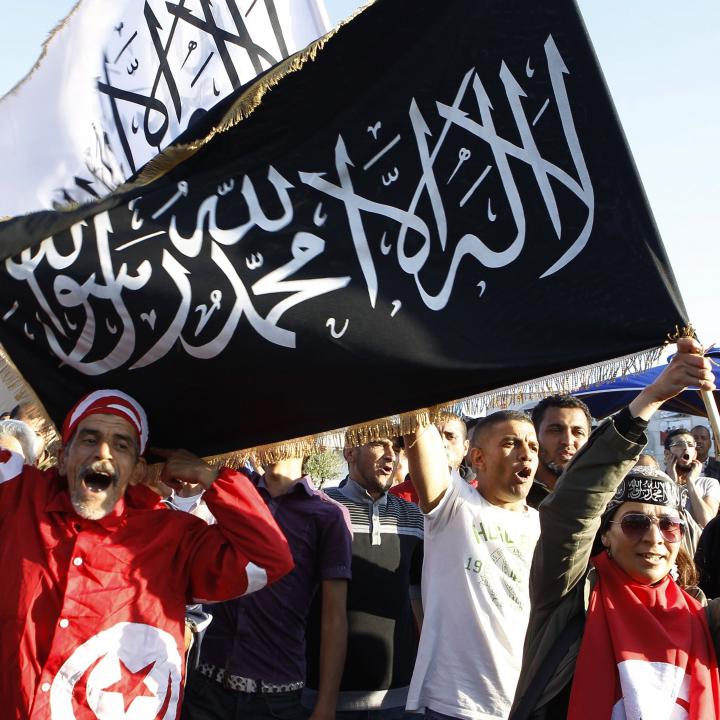

Amid the recent turmoil, one Salafist group is attempting to outhustle its rivals and the government by flexing its organizational muscles on the street.
Following the February 6 assassination of leftist-secular opposition leader Chokri Belaid, the risk of security breaking down throughout Tunisia increased sharply. Although the situation has calmed down for now, with many citizens returning to their everyday activities, Islamist faction Ansar al-Sharia in Tunisia (AST) took advantage of the unrest by activating its "Neighborhood Committees" for the first time. The group's ability to mobilize forces across the country within a matter of hours illustrates both its organizational strength and its members' obedience to orders from the top.
Originally called "Security Committees," the Neighborhood Committees were established on October 6 as a precautionary measure in case a security vacuum opened within the country -- in other words, AST created a de facto non-state-controlled martial law force. The move was spurred by the looming October 23 anniversary of the 2011 Constituent Assembly election, in which the people had voted on who would write the country's post-revolution constitution. Yet no major security issues developed, and the date passed without the committees taking action.
This changed last week, though, in light of tension on the streets following Belaid's murder. Looters quickly attempted to take advantage of the situation, and although many have since been arrested, the perceived lack of security led AST to begin activating its committees the day after the assassination. The group's stated goal was to protect the people, their money, and their property by warding off thieves. Within a few hours, it was able to mobilize members in Sfax and Hammamet for the night of February 7. The mobilization was even swifter the next day, spreading to several other towns as well as portions of the capital. AST conducted some of its patrols with the League for the Protection of the Revolution, believed to be a hardline faction associated with leading Islamist faction an-Nahda.
Pictures and videos posted to AST's official Facebook page over the past few days show presumed group members hanging around certain streets or riding on scooters and motorcycles through various cities. In all cases they are waving the Rayyat al-Tawhid, the flag made famous by al-Qaeda in Iraq, with the first half of the Muslim testament of faith on top and the Prophet Muhammad's official seal beneath (jihadists call it the "black flag"). For extra effect, AST added anashid (a cappella religious music) to the videos, providing a more visceral emotional background meant to inspire pride in the group's efforts to "protect" citizens.
The number of AST members who joined the patrols varied by place, ranging from ten to at least fifty in some spots, if not more. The largest turnout was in al-Qayrawan, where the show of force extended to Saturday -- committee members rode through the center of the city in broad daylight in a convoy of scooters and cars, holding up the black flag. AST framed all of this in terms of protecting residents and emphasizing its role as the true bearer of stability in Tunisia, contrasting itself with the state and using the slogan "Your Sons Are at Your Service." Indeed, the group has sought to build a state within a state since its March 2011 founding -- adding security patrols to its social-welfare activities gives it a strong selling point for the many Tunisians dissatisfied with the government, and for Islamists disillusioned with An-Nahda.
The true situation on the ground is slightly different, however. Conversations with individual Tunisians indicate that most of the AST patrols have been no more than photo-ops -- despite standing "guard" overnight in certain neighborhoods, the group showed little sign of truly securing any of these areas, especially since worries of widespread violence have yet to materialize. More likely, AST is laying the groundwork for a potential split within An-Nahda, co-opting hardliners who are perplexed by the draft constitution's concessions to secularists and the perceived moderate stances of Prime Minister Hamadi Jebali. Although the group could one day impose some form of true martial law in certain locations, it has yet to show clear evidence of having such capabilities.
That said, the rapid, widespread mobilization does illustrate that AST is a strong organization. As it continues to provide social-welfare services, it will likely be able to project power in even more locations, as well as call on even more individuals to back its plans. For now, the Neighborhood Committees have probably been told to stand down, since AST has not posted anything related to them since the weekend. In any case, the group continues to gain prestige and credibility among a certain segment of the population, so it will no doubt persist in attempts to outhustle its Islamist rivals and the government.
Aaron Y. Zelin is the Richard Borow fellow at The Washington Institute.


